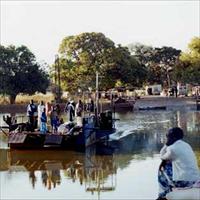SENEGAL: Citizens on coastal environment watch

Concrete walls, boulders, tyres; enclosed vegetable gardens: These are just some of the means Senegal’s coastal communities are using to stop trash-dumping and sand-mining as well as the reckless chopping down of the coast’s protective trees.
These illegal but profitable activities are eroding Senegal’s coast and damaging the marine environment, and community groups and authorities say it must stop.
“There is increased exploitation along this strip that must prompt the local population to mobilise to protect this treasure,” El Hadj Amadou Bèye, president of SOS Littoral (SOS Coastal), told IRIN.
The organisation, created in 2007, installs all sorts of protective barriers and educates coastal residents “in an effort to block these horse and cart drivers who attack the marine environment”, Bèye said.
The trees (casuarinas equisetifolia) - planted between 1925 and 1949 by the colonial power France along the coast from the capital Dakar to Saint Louis about 270km to the northeast - were meant to protect vegetable gardens near the coast from sanding over and stem coastal erosion.
“These trees have a clear function in the life of the coastal populations and visitors,” said Amadou Baldé, an agricultural engineer who lives along the coast and is a member of SOS Littoral. “But the trees are being wiped out. It’s a discouraging and intolerable situation for us, the inhabitants.”
The tree’s wood - ideal for cooking - is prized by those running Dakar’s shops selling grilled meat, called ‘dibiteries’. The needles are used as fertiliser by vegetable growers and the wood for furniture.
Exploitation of the sand is lucrative as well. “With the real estate boom in Dakar, entrepreneurs are crying out for more,” agriculture engineer Baldé said. “One horsecart driver, if he is free to move about as he wishes, can do 20 loads a day, at 2,000 CFA francs (US$4.46). It’s more profitable than a taxi.”
Another way the coastal area is being exploited to make money is rubbish dumping. Owing to Dakar’s ineffective refuse disposal system, Yakham, a cart driver for 40 years, does well for himself. “I no longer need to return to the village to work in the fields,” he told IRIN. “With my horse, I make a decent living.” If he doesn’t find merchandise to deliver to area shops, he collects rubbish, dumping it along the coast. Illiterate, he is unaware of the environmental regulations which prohibit such dumping.
Environmental activists say local officials have failed in their duty to ensure proper refuse disposal.
Citizen action
The current surge in local initiatives to protect the coast illustrates the scale of the damage to the coastal zone. Local environmentalists, however, have meagre means. They fight their fight through the creation of monitoring committees, through awareness-raising campaigns and by putting up their makeshift barriers.
They also collaborate with the security forces. “These horse and cart drivers are youths who are aggressive and often armed [with wooden clubs],” engineer Baldé said. “They come at night or during the weekdays when we are at work… to come and remove the barriers.”
Residents of coastal neighbourhoods have spoken out against those extracting sand or wood, risking a brawl. They have begun to change tactics, favouring instead a community alert system.
Since the beginning of the year, 30 people have been arrested for the illegal extraction of coastal sand and 36 horse-drawn carts have been immobilised by gendarmes, according to the national gendarme spokesperson, Daouda Diop.
He said the gendarmes have a new environment squad, assisted by personnel in the coastal zones who patrol on motorbikes and on horseback. “I am pleased with the collaboration of the residents who stop the cart drivers and inform us via a toll-free number.”
Residents are voluntarily standing guard and patrolling to compensate for a lack of water and forest department agents, observers say. “Just two agents cannot keep watch on the 8km of protected forest [north of Dakar],” SOS Littoral’s president, Bèye, said. “The authorities must multiply that by three or four.”
In a recent visit to Guédiawaye - a suburb of Dakar seen as the nerve centre of the coastal band - Environment Minister Djibo Ka promised to put more agents on duty in the zone. “I am looking at how to put up an enclosure wall – I will put the necessary resources into saving this protected forest.”
New laws?
In mid-November, members of a parliamentary environment committee visited the coastal zone. Lamine Thiam, head of the delegation, told reporters the members would call on the government to put in place “a special programme of coastal management as well as make sufficient funds available to ministries dealing with the environment.”
Thiam said: “The fight against coastal erosion is a delicate environmental issue and the management of Senegal’s coasts is a priority.” He said environmental laws were being studied to determine how well they provided coastal protection.
Rather than simply enforcing the law, agriculture engineer Baldé thinks it is possible to redeploy the horses and their owners: “We can envision transforming this strip of trees, replacing the cargo carts with passenger carriages to transport visitors so they can visit the forest, walk in the sand and breathe in the sea breeze.”
 Back and Next - Back and Next
Back and Next - Back and Next See Also - See Also
See Also - See Also